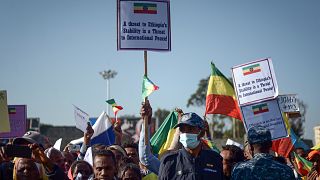Ethiopia
After a day long meeting by the 36 Executive Committee members of the ruling Ethiopian People’s Revolutionary Democratic Front (EPRDF) a statement released by the politburo said Ethiopia will fully accept the December 12, 2000 Algiers Agreement, a peace agreement between the governments of Eritrea and Ethiopia, which established a special boundary commission, the country’s Addis Standard reports
News update: #Ethiopia accepts the #AlgiersAgreement in bid to normalize relations with #Eritrea; opens up its economy https://t.co/At8JnknEc3 Eritrea had accepted EEBC’s decision & refused to submit to further negotiation without the acceptance by Ethiopia of EEBC's decision pic.twitter.com/1n271rRlg4
— Addis Standard (@addisstandard) June 5, 2018
The Algiers agreement stipulated that the two states, fresh out of a two year costly war, would accept a decision by the Eritrea Ethiopia Boundary Commission (EEBC) as “final and binding.” However, when the EEBC delivered its decision awarding the town of Badme, the epicenter of the war that killed tens and thousands from both sides, to Eritrea, Ethiopia backtracked from its commitment with the late Prime Minister Meles Zenawi eventually declaring Ethiopia will only accept the EEBC decision “in principle,” leading to sixteen years state of no war no peace between the two countries and frustrating the international community.
Ethiopia has agreed to fully accept the Ethio-Eritrea boundary commission which ruled the disputed territory of Badme to be Eritrean territory. This is critical for the two countries & the broader Horn. Very smart move by Ethiopia. Now, the ball is in Afeworki's court.
— Awol Allo (@awolallo) June 5, 2018
End of border feud
Addis Standard further reports that by accepting the Algiers agreement Ethiopia will have to withdraw its occupying forces from all territories awarded to Eritrea by the EEBC, including the flashpoint town, Badme.
Ethiopia also called on Eritrea to reciprocate the decision and work toward bringing a lasting peace between the people of the two countries. Eritrea had accepted EEBC’s decision and refused to submit to any further negotiation without the prior acceptance by Ethiopia of the commission’s decision.
#Ethiopia: By agreeing with the border commission's findings, Ethiopia's governing #EPRDF coalition appears to be ending its claim to the disputed areas along its border with #Eritrea, including the town of #Badme.
— Rachael Akidi (@rakidi) June 5, 2018
Open economy
In a related development, the EPRDF executive committee first day meeting has decided to open up Ethiopia’s economy both to Ethiopian and foreign investors by making partial or full privatizations in key state owned enterprises including industrial parks, railway projects, sugar factories, hotels and other manufacturing industries.
a href=“http://www.africanews.com/2018/06/05/ethiopia-s-parliament-lifts-state-of-emergency-state-media/” target=”_blank”>ALSO READ: Ethiopia’s parliament lifts state of emergency: state media
In a stunning departure from its own economic policy, the EPRDF has also decided to transfer shares in mega state owned including the national carrier Ethiopian Airlines, state monopolies Ethio-telecom & Ethiopian Shipping and Logistics Service Enterprise, and hydroelectric projects both to Ethiopians and foreign investors. The government will continue having a majority share in these companies.
The executive committee spent much of the day discussing the two year and half performance report of GTPII, which revealed shocking details about the dismal state of the economy.












Go to video
Kenya set to surpass Ethiopia as East Africa’s largest economy in 2025 – IMF
Go to video
Ethiopians mark Easter with calls for peace and love amid ongoing conflict
02:19
Ethiopians in Washington D.C. keep ancient language and orthodox traditions alive
02:15
Ethiopia's Tigray struggles to care for war wounded
Go to video
Is Ethiopia at war again? A look at the rebellion in one of its most powerful regions
Go to video
Lt. Gen. Tadesse Werede named the new interim president of the Tigray region